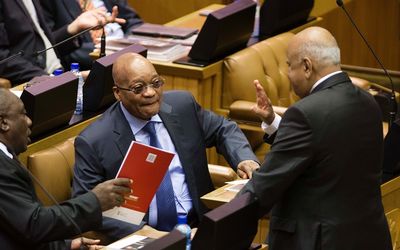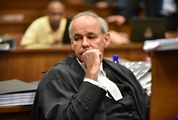FEBRUARY has come and gone. The state of the nation and the budget, major policy statements on the economy, have been laid before an anxious public. What now? They say autumn is the most honest season. Leaves and flowers fall away to reveal what lies beneath. Summer’s hotheadedness gives way to an ominous chill. Already, the united front presented by President Jacob Zuma and Finance Minister Pravin Gordhan through the two major policy statements is fraying.
In a recent column, I described the president’s state of the nation address as a dose of reluctant realism. His performance reminds one of the Roman mythical figure Janus, who is depicted with two faces — one facing forward, the other backward. In the state of the nation, we were presented with one of Zuma’s faces, looking forward to the future, preaching pro-growth and pro-reform sentiments. At other times, though, we are presented with another unrepentant face, one that looks back to the past few weeks (or years) and tries to justify poor decisions and lapses of leadership.
It is from Zuma’s other face that we receive disconcerting statements that undermine the work being done to restore the country’s economic policy credibility. He argued that markets overreacted to former finance minister Nhlanhla Nene’s removal in December. In an ironic display of credentialism, he lauded Desmond van Rooyen as the most qualified finance minister he has appointed. If anyone disdains the idea that a clutch of certificates trump determined self-education and a track record, it should be our president.
The much-anticipated budget bewildered some analysts and commentators for its moderate measures to get the economy back on track. In it, they saw a lukewarm response in the face of crisis. I see the logic of achieving fiscal consolidation without extreme, growth-destructive austerity. But if the moderate approach does not deliver, come the medium-term budget policy statement in October, Gordhan will have to lay the ground for tougher measures. And yet, he has been quoted as saying political support for his fiscal positions can be judged by whether he is still in his chair by October. Not exactly reassuring.
The budget bet on improving governance at state-owned enterprises and reining in public expenditure. These are politically sensitive matters. They cannot be driven by an ambivalent president and a finance minister under siege.
Zuma’s Janus-like posture tells the world he is not convinced he has made any errors. He does not believe he caused damage to the economy with his ill-conceived shuffling of finance ministers. He does not see that he has enabled some individuals to mislead state-owned enterprises. He finds no fault with his handling of Nkandla. Instead, he tries to explain how his critics are blinded by western thinking. His manner is that of a man who feels himself misunderstood, and who has to follow a script imposed on him.
Yet he must know the economy is in deep trouble. A crisis of confidence is one of the toughest challenges. In the aftermath of a natural disaster, infrastructure can be built again, people put back to work, institutions reconstituted. But to kick-start an economy wallowing in institutional malaise and policy uncertainty requires a determined battle to recapture hearts and minds and focus them on transformative goals. Zuma and Gordhan tried to do this before their February showpiece statements, reaching out to key constituencies for support and advice. That was an opening act. There is a long road ahead towards co-operation for inclusive growth.
At a postbudget briefing event, I overheard someone say that this year’s budget is interesting, but the political economy behind it is even more interesting. It’s not interesting, it’s dangerous. We need our leaders to look forward and steer us away from economic ruin.
• Trudi Makhaya is CEO of Makhaya Advisory

Finance Minister Pravin Gordhan, right, greets President Jacob Zuma, centre, and Deputy President Cyril Ramaphosa shortly before delivering the budget speech in Parliament on Wednesday. Picture: TREVOR SAMSON
FEBRUARY has come and gone. The state of the nation and the budget, major policy statements on the economy, have been laid before an anxious public. What now? They say autumn is the most honest season. Leaves and flowers fall away to reveal what lies beneath. Summer’s hotheadedness gives way to an ominous chill. Already, the united front presented by President Jacob Zuma and Finance Minister Pravin Gordhan through the two major policy statements is fraying.
In a recent column, I described the president’s state of the nation address as a dose of reluctant realism. His performance reminds one of the Roman mythical figure Janus, who is depicted with two faces — one facing forward, the other backward. In the state of the nation, we were presented with one of Zuma’s faces, looking forward to the future, preaching pro-growth and pro-reform sentiments. At other times, though, we are presented with another unrepentant face, one that looks back to the past few weeks (or years) and tries to justify poor decisions and lapses of leadership.
It is from Zuma’s other face that we receive disconcerting statements that undermine the work being done to restore the country’s economic policy credibility. He argued that markets overreacted to former finance minister Nhlanhla Nene’s removal in December. In an ironic display of credentialism, he lauded Desmond van Rooyen as the most qualified finance minister he has appointed. If anyone disdains the idea that a clutch of certificates trump determined self-education and a track record, it should be our president.
The much-anticipated budget bewildered some analysts and commentators for its moderate measures to get the economy back on track. In it, they saw a lukewarm response in the face of crisis. I see the logic of achieving fiscal consolidation without extreme, growth-destructive austerity. But if the moderate approach does not deliver, come the medium-term budget policy statement in October, Gordhan will have to lay the ground for tougher measures. And yet, he has been quoted as saying political support for his fiscal positions can be judged by whether he is still in his chair by October. Not exactly reassuring.
The budget bet on improving governance at state-owned enterprises and reining in public expenditure. These are politically sensitive matters. They cannot be driven by an ambivalent president and a finance minister under siege.
Zuma’s Janus-like posture tells the world he is not convinced he has made any errors. He does not believe he caused damage to the economy with his ill-conceived shuffling of finance ministers. He does not see that he has enabled some individuals to mislead state-owned enterprises. He finds no fault with his handling of Nkandla. Instead, he tries to explain how his critics are blinded by western thinking. His manner is that of a man who feels himself misunderstood, and who has to follow a script imposed on him.
Yet he must know the economy is in deep trouble. A crisis of confidence is one of the toughest challenges. In the aftermath of a natural disaster, infrastructure can be built again, people put back to work, institutions reconstituted. But to kick-start an economy wallowing in institutional malaise and policy uncertainty requires a determined battle to recapture hearts and minds and focus them on transformative goals. Zuma and Gordhan tried to do this before their February showpiece statements, reaching out to key constituencies for support and advice. That was an opening act. There is a long road ahead towards co-operation for inclusive growth.
At a postbudget briefing event, I overheard someone say that this year’s budget is interesting, but the political economy behind it is even more interesting. It’s not interesting, it’s dangerous. We need our leaders to look forward and steer us away from economic ruin.
• Trudi Makhaya is CEO of Makhaya Advisory





















Change: 0.80%
Change: 0.61%
Change: -0.25%
Change: 0.13%
Change: 4.02%
Data supplied by Profile Data
Change: 1.13%
Change: 0.37%
Change: 0.80%
Change: 0.00%
Change: 0.33%
Data supplied by Profile Data
Change: -2.03%
Change: -1.51%
Change: -1.45%
Change: -2.26%
Change: -0.91%
Data supplied by Profile Data
Change: 0.07%
Change: 3.71%
Change: 2.65%
Change: 3.36%
Change: 4.99%
Data supplied by Profile Data